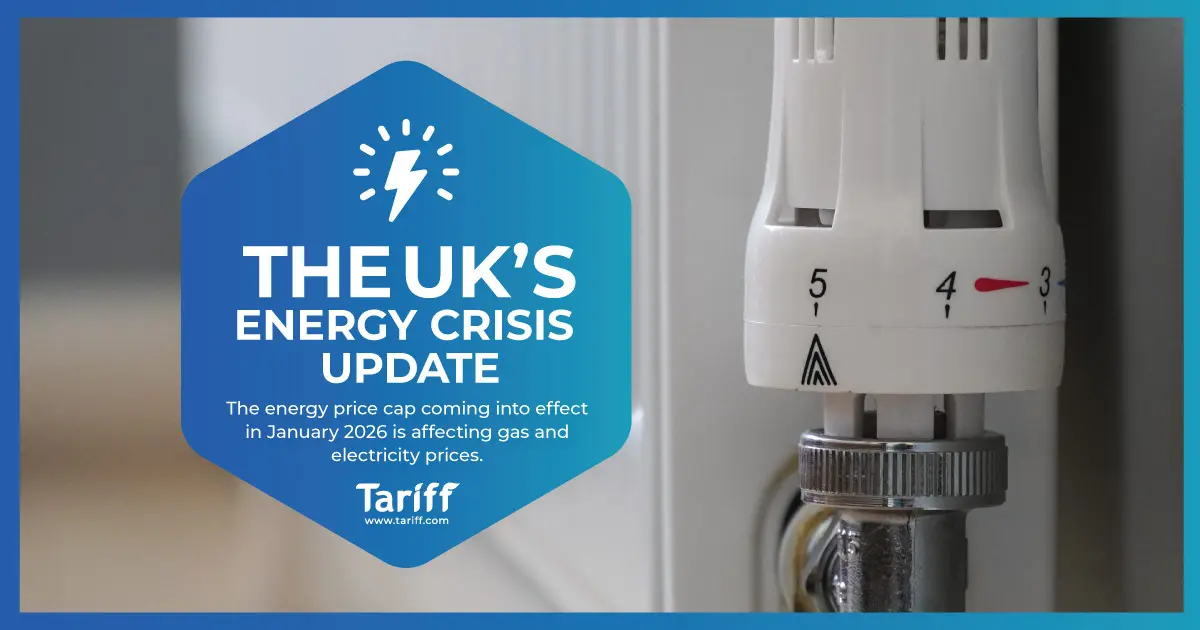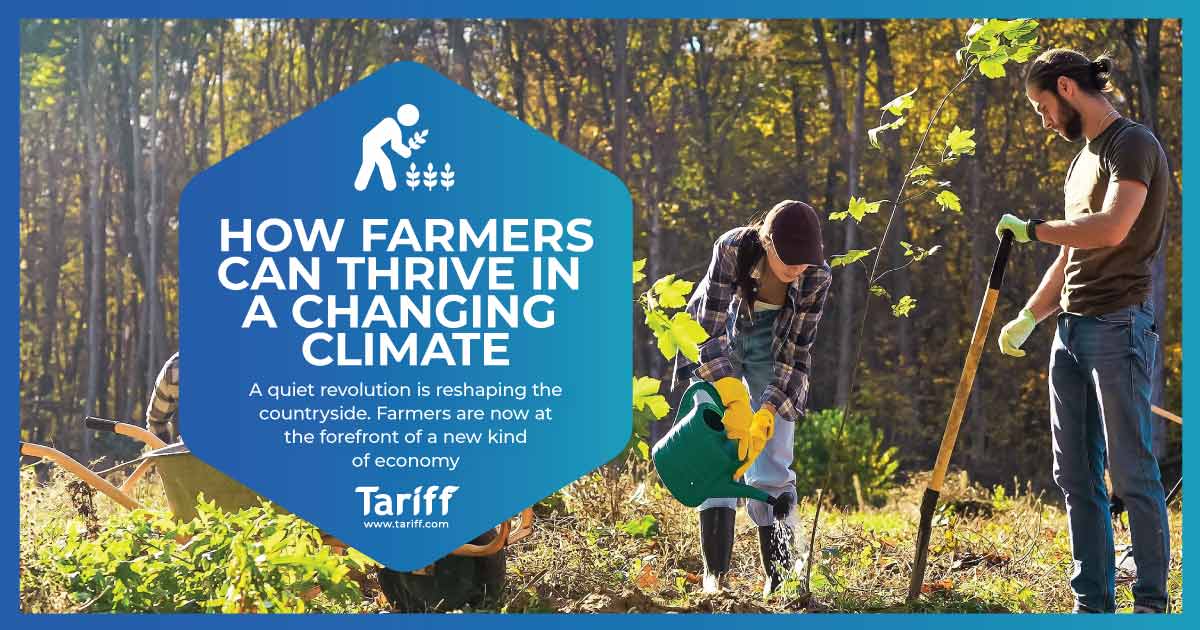What Is The Impact Of Water Waste On The Environment?
It’s common knowledge that wasting water has its far-reaching and often devastating impacts. That could be on your bank account in the form of an inflated water bill, across local and countrywide news as droughts and hosepipe bans, or more globally in the form of pollution and environmental impact.
In fact, the detrimental effect that wasting water has on the environment is much greater than you might anticipate. From playing a role in the state of global food poverty, to contributing massively towards the inexorable change in our climate, water wastage is a daunting prospect that we need to face as a planet.
As one of the UK’s leaders in promoting better climate and energy practices, Tariff fully understands the pressing need to change our habits for the better. We’ll break down just how wasting water impacts the environment, and what you can do to instigate and sustain a meaningful change.
What Is Waste Water And Where Does It Come From?
In essence, waste water is any water that’s already been used for a purpose, or that’s been deployed to transport waste products. The most common examples of this are household items, like showers, toilets, washing machines, and even your kitchen sink.
While it might seem a simple definition, it’s crucial we understand what’s meant by water wastage. It not helps inform us how the water we use can have an effect on the world around us, but how we can bring about sustainable and impactful change.
It’s inevitable that there’ll be some form of waste water on a daily basis. Brushing your teeth, preparing food, and using the toilet all consume water in some capacity, and contribute towards the overall level of waste water that a household or business consumes.
Recent data from Statista estimates that the average UK resident consumes around 152 litres of water per day across everything they do, ranging from making a cup of tea to showering or bathing in the evening or morning.
There is some variation in this, however, which does provide an interesting insight into what can be changed about the average person’s water consumption. Customers who used a meter to measure their water consumption averaged 139 litres of water per day, compared to the average of 152 for those not metered.
Examining further statistics on water usage by appliance type helps us better understand the core concepts behind this lower consumption of water. Baths lead the way with an average water usage of 80 litres, while a typical washing machine uses upwards of 50 litres per cycle.
Comparatively, an electric shower uses 5 litres per minute, and running a dishwasher on its eco setting uses 10 litres, or 14 litres when not using that setting. Even with these water-saving options, waste water is totally unavoidable.
However, by limiting our water usage, we’re able to better prevent against the devastating effects that excessive water consumption can have on our delicate ecosystem, our environment, and the planet we live on. Let’s break down a few of those key impacts.
3 Huge Environmental Impacts From Water Waste
As inescapable as water waste is, it’s excessive consumption and wanton use of water that can lead to serious environmental issues, and irreversible consequences. We’ll break down just 3 of the key considerations, and why it’s crucial you keep these in mind when you’re using water at home or in your business.
1. Excessive Water Consumption Can Lead To Ecosystem Disruption
The water we use comes from freshwater sources, such as rivers, lakes and reservoirs, as well as streams and other ground water sources. Not only do these act as a integral source for our water, they’re an exceptionally diverse habitat and a self-sufficient ecosystem.
That’s especially true for insects, amphibians and birds, such as frogs and herons, whose entire lifecycle is based among the bullrushes and banks of the UK’s intricate system of rivers and marshlands.
A surge in demand for water has a drastic often untold adverse effect on our rivers, streams and lakes, as well as rapidly draining our reservoirs and other ground water sources. It’s likely something you’ll have already witnessed in some capacity, especially over hot summers or particularly dry seasons.
However, sustained overuse can place an additional strain on our water supplies, which in turn leads to further disruption for the animals and plants that rely on those water sources to survive. This can significantly affect the biodiversity of our ecosystems, especially on a local level, and we run the risk of losing some of the natural beauty we can see across our countryside.
2. Further Waste Water Leads To Greater Pollution
When we use water, whether that’s washing the dishes or having a shower, we drain away the waste water. As that drains, it needs to go somewhere, and while there’s significant efforts to recycle water supplies, much of it still goes to waste.
The UK’s sewer system is one of the best in the world, and aims to treat as much as possible and recycle it safely back into the main water system. Here’s a brief overview of the process that your waste water goes through:
- First, you’ll flush or drain away your wastewater.
- The waste water will undergo a screening process where larger objects are removed. While many won’t flush things like sanitary towels or cotton pads down the toilet, there are still some that do end up in the waste system.
- Then, wastewater is filtered using a series of increasingly fine meshes. This helps separate the solid “sludge” from the liquid waste, so that the solid matter can be collected while the water moves on.
- Next, odours and bacteria are filtered out of the water through a process called aeration. In this, oxygen is added to the waste water and “sludge” to ensure that its safe for release back into the waterways and the environment.
However, as much as this thorough process seeks to eliminate the pollution and damage that sewage can do to the environment, it’s not as effective a process as it once was. In fact, recent data from the charity Surfers Against Sewage found that, over the course of 2020, there were almost 3000 incidents of sewage being dumped back into the water supply, across beaches, and into oceans.
This means that, while there’s long been concerted efforts to ensure that our oceans and coastlines stay clean, it’s now becoming a pressing issue. More ocean pollution means huge disruption to our coastal ecosystems and wildlife, as well as discolouration across our wild grey oceans.
There’s also the very real risk of illness to bathers and ocean goers, especially as microbes and bacteria seep into our oceans, and become more resistant to the treatments our water undergoes, as well as the antibodies our immune system produces.
That’s something that same SAS study found, with 9% of their respondents being colonised by resistant bacteria. This is a trend that’s only likely to continue, and could lead to further closures across streams, beaches and inlets.
3. Wasting Water Leads To Definitive Climate Changes
Arguably one of the more serious consequences of using excessive water is the definitive negative effect it has on our climate. There’s multiple ways in which this can happen, but the most immediately concerning is the rising sea levels.
As more and more waste is improperly processed and pumped directly into our oceans, sea levels will undoubtedly begin to climb, leading to widespread flooding, and further adverse weather effects such as hurricanes, typhoons, and tsunamis.
Naturally, these extreme meteorological conditions alone are a cause for concern, but rising sea levels can also affect groundwater sources further inland, depositing salt and other harmful elements and risking the safety of the water we use at home.
It’s a knock-on effect that goes further than that, too. The more water we waste, the more processing and cleaning that needs to happen as part of the water treatment procedure.
This in itself is an energy-intensive but necessary process, but as it takes on more load from wasted or unused water (such as from a dripping tap or leaky pipe), it needs to work even harder to process the additional load that’s being placed on it.
As our water treatment facilities taken on more work, so too do those who are tasked with ensuring the same running of them, meaning further pressure on an already strained energy market, and the climate as a whole.
What’s Being Done To Combat Wasted Water?
While the information on the amount of water we waste makes for grim reading, there is still a glimmer of hope. There’s various initiatives that seek to alleviate some of the pressure we’ve seen across Britain’s waterways, as well as promote more conservative lifestyles that save water across everyday tasks.
As one of the UK’s most forward-thinking energy switching companies, Tariff have handpicked a few of our favourite initiatives, as well as one’s that have already got a proven track record of reducing water waste across the country.
Online & In-Person Campaigns
There’s numerous charity- or brand-led campaigns that seek to not only raise awareness of the risks of wasting water, but to also provide actionable and easy-to-implement steps for homes and businesses to take meaningful action.
Here’s just a couple of the best, from pioneers across water saving initiatives:
- The Waterwise 2023 Pledge – Spearheaded by independent water campaigners and activist group Waterwise, their 2023 pledge challenges consumers to “Save 2023 litres across 2023”. By signing up for the initiative, Waterwise will send out a “challenge” each day, which is specifically designed to ensure that you save water on a daily basis. These are usually simple, such as timing a shower or make vegetarian meal choices, but together they add up to a huge amount of water saved.
- Water’s Worth Saving – A national campaign launched through social media during the heatwave that happened over the course of 2020, it provides pertinent information and tips on how to better manage the water that you use. With an estimated reach of over 21 million people, it’s one of the UK’s most impactful and far-reaching water saving initiatives.
While there’s a great many other schemes and ideas that aim to stem the tide of water wastage, the two we’ve mentioned above really encapsulate the core idea of making small, sustainable changes that ultimately lead to long-term adjustments.
Governmental Policies & Schemes
While initiatives that are led by individuals or corporations can clearly have far-reaching implications, government legislation is arguably much more important. Given the pressing need to address these issues, there’s been multiple stratagems to combat wasted water
- The OECD Water Governance Initiative – Offered by the Organisation for Economic Cooperation and Development, the Water Governance Initiative set out standardised and regimented practices for the best usage of water across the world, as well as how to better preserve the water we have.
- The UN Water Action Decade – Beginning in 2018, and set to end in 2028, the UN’s Water Action Decade set out with two key goals in mind – improving knowledge that surrounds water and water pollution across the globe, and improving communication between world governments to ensure access to clean, potable water.
- Water Management Grants – Aimed at those in the agricultural sector, the government-issued Water Management Grant provides funding, information and guidance for improving productivity across farms and arable lands, using irrigation equipment, and creating a greater level of sustainability for water.
Of course, while these government initiatives and grants offer a significant way forward, they’re simply not applicable to everyone, and for businesses especially, more needs to be done. And with Tariff’s services, it’s never been easier to make that change.
What Can My Business Do To Help Challenge Water Wastage?
There’s multiple different ways for businesses to challenge the water that they and their employees use on a daily basis. The primary one, and easily the most immediate and impactful, is using a business water switching service like Tariff. Let’s break down exactly what we can do for your business and its water consumption.
We’ll Complete A Full Site Survey
Our first step in helping your reduce your business water bill is by performing a complete survey of the business you operate. Whether this is a boutique shop or a huge office block, we’ll approach this task meticulously and thoroughly – it’s the basis of a successful and beneficial relationship between us and you.
This not only helps us and you understand where you’re utilising your water and where the figure on your bill comes from, but also how you can best support the environment, and reduce your business’ impact on the waste water we all contribute.
Our experts will then go on to monitor the water you use, keeping track of the key metrics to ensure that our data is as accurate as possible.
We’ll Discuss & Implement Strategies
Once we’ve completed a comprehensive survey of your site, we’ll then start brainstorming strategies and schemes you can implement for a more sustainable and ultimately cheaper future. This could be something as simple as running the office dishwasher on an “eco” cycle, or installing a hot water boiler to reduce water consumption by a kettle or coffee machine.
All of these will be overseen by an expert consultant who’s got extensive experience in helping businesses like yours make those long-term changes. We’ll be able to give you tailored advice on how you can best make those adjustments, and even give you an insight into how much you could save by making those alterations.
We’ll Compare Alternative Water Suppliers
Once you’ve implemented our suggested adjustments and changes for your business’ water, we can then start to look at alternative suppliers. This is where businesses really differ from households – the business water market was deregulated back in 2017, meaning businesses are able to choose who supplies their water.
There’s multiple benefits to this. The primary one, and arguably the one that’s most important to many business owners, is that you can essentially command a lower price for your water, and move away from your costly current provider.
However, equally beneficial is that you’ll be able to switch to a provider who’s got better credentials when it comes to waste disposal and environmental practices. This also means you’ll be able to attract customers and staff who prioritise companies with good “green” policies, which in turn can mean greater revenue.
We’ll do all of this for you, sourcing the best options for the size of your business, what you’re most concerned about, and how you can best address that. For instance, if you’re worried about your business’s carbon emissions, we’ll be able to find a water supplier whose core ethos revolves around eco-conscious practices and technologies.
We’ll then pass our findings on to you, so you can make the final decision on who provides the water for your business.
We’ll Complete All The Switching Paperwork
One of the main hurdles in changing any provider with your business is the reams of paperwork and forms you need to fill in. With Tariff, that becomes a thing of the past – we’ll complete all the necessary paperwork for you.
All you’ll need to do is provide us with any necessary information, and we can do the rest. You’re even able to centralise all your energy bills through us, and remove all the hassle out of keeping track of multiple providers.
The first step in all of this is to get in touch with our knowledgeable team today, and we’d be more than happy to provide you with a no-obligation, completely free quote.


